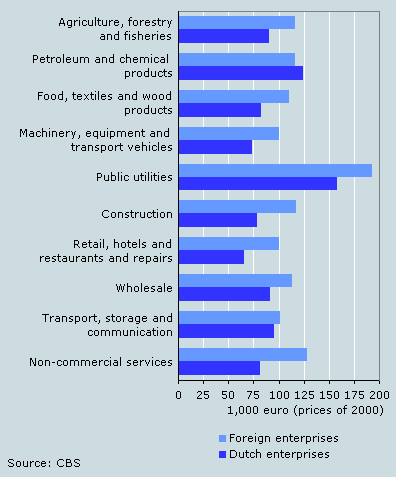Foreign companies outperform their Dutch counterparts

The average labour productivity of large, foreign-owned, non-financial companies in the Netherlands has increased since 2000. Over the period 2000–2005, the average value added produced per person employed in the non-financial sector has risen from 90.7 to 111.2 thousand euro, an increase by 23 percent.
The average labour productivity of equally large, Dutch-owned non-financial companies increased by 15 percent from 74.3 to 85.4 thousand euro in the period 2000–2005.
Average labour productivity of large, non-financial companies in the Netherlands, 2000–2005

Foreign companies in high-productive sectors
Part of the discrepancies in labour productivity between foreign-owned and Dutch companies can be accounted for by the fact that foreign-owned companies are relatively more often active in sectors where the average output per staff member is higher. In 2005, the share of foreign companies in high-productive areas was 52 percent, as against 38 percent in low-productive areas.
But there are also differences in average output between foreign and Dutch companies active within the same sector. Differences are relatively large in retail trade, hotels and restaurants and repair. Foreign companies in this sector are, for example, car and car component retailers.
Costs of adaptation to the Dutch situation
Costs of adapting to the Dutch language, laws and rules, culture and market partly account for the differences in labour productivity per person employed. Foreign companies are prepared to invest in the Netherlands, provided they can offset the costs of adaptation by producing better or cheaper products or production processes, i.e. higher labour productivity in comparison to Dutch companies. Head office and supporting services are usually located in the country of origin. In that case, the overhead costs of Dutch companies push down productivity figures.
Average labour productivity of Dutch and foreign-owned companies active in the Netherlands, 2005

Fabienne Fortanier